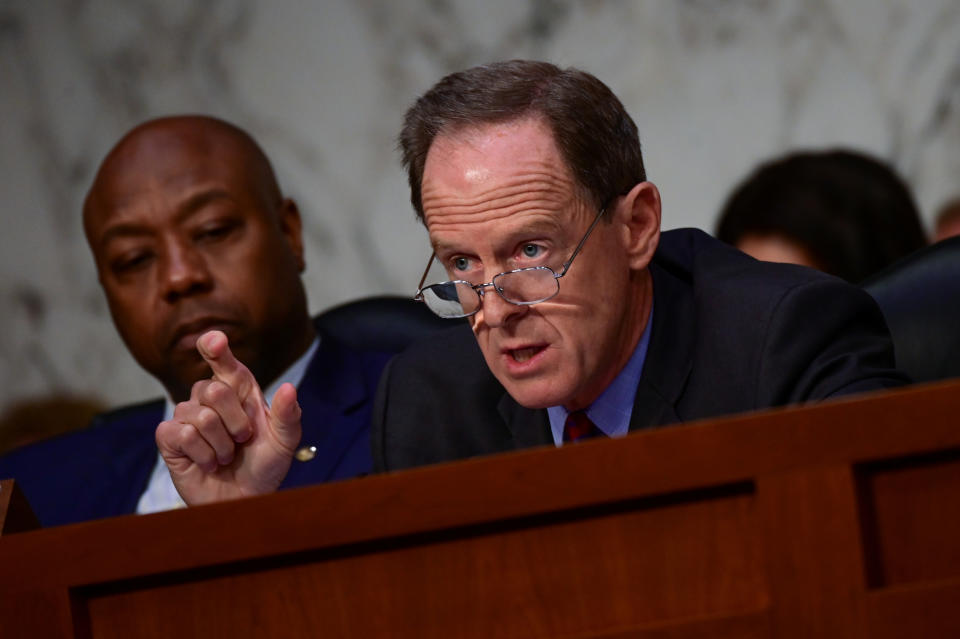President Trump's auto tariff decision due in days
President Donald Trump is running out of time before he’s due to decide whether to put tariffs on auto imports.
After delaying the decision by six months, Trump now faces a deadline of Nov. 13. While it’s not clear what he plans to do, Commerce Secretary Wilbur Ross recently told Bloomberg the tariffs might not be needed.
The U.S. and Japan signed a limited trade deal last month. It doesn’t deal directly with automobiles, but Prime Minister Shinzo Abe said he had assurances Japan would be spared from the tariffs. The European Union and the U.S. have made no such deal.
“The prevailing view is he’s going to kick the can,” said William Reinsch with the Center for Strategic and International Studies.
Trump has a variety of options moving forward, including a 25% tariff on auto imports. He could also go with a lower tariff rate or he could just target auto parts. He could push the decision and establish a new deadline or he could do nothing.
“Typical Trump — he’s not going to say they’re gone,” said Reinsch. “There are two ways to do nothing: One is to announce you’re not going to do anything, which would take it off the table. I don’t think that’s likely, because he never takes stuff off the table. What is possible is he’ll just say I’m not going to do anything right now.”
Senate Finance Chairman Chuck Grassley (R-IA) told reporters on Wednesday he has a “gut feeling” the decision will be delayed again.
‘Economically and politically painful’ retaliation
Sen. Pat Toomey (R-PA) argues auto tariffs would be a big mistake and a misuse of Section 232 tariffs.
“We know for sure that the Europeans would retaliate against any number of categories of American exports,” said Toomey in an interview with Yahoo Finance. “The Europeans are very sophisticated about picking those that are most economically and politically painful as retaliation because they're not going to just sit back and just take this.”
European Trade Commissioner Cecilia Malmstrom has said that the EU would retaliate with its own tariffs on American products.
Lawmakers and industry groups have warned that auto tariffs would increase the cost of cars for American consumers and could lead to job losses.
“Cars aren’t a national security threat, and tariffs would boost car prices across the board and driving up car repair and maintenance costs – tariffs are essentially a massive tax on consumers,” said Wade Newton with the Auto Alliance. “The higher prices would lower consumer demand and could lead to the loss of as many as 700,000 American jobs. The tariffs would also roll back the benefits from the Trump tax cut and have widespread impact across manufacturers, suppliers, and dealers in all 50 states.”
Newton also said tariffs could threaten domestic and international automakers’ investment in the United States.

Toomey told Yahoo Finance new tariffs would come at an especially bad time.
“We have so much trade uncertainty with China— and that uncertainty and the adverse consequences of the tariffs themselves, the combination has certainly slowed down economic growth relative to where it would have been. It's not a good idea, in my view, to open up another front in another trade war,” said Toomey.
Toomey is fighting to see the Commerce Department report detailing how foreign auto imports present a national security threat. Trump received the report in February, but it has not been made public. Toomey wants to read the “shocking conclusion” for himself.
“Think about what the report is concluding. It's concluding that is a threat to America's national security when, say, Pennsylvanians buy a Volkswagen,” said Toomey. “That’s sort of surprising news to a lot of Pennsylvanians, I think. So many of us would like to see what's the logic and what's the data behind this.”
Grassley said he thinks the findings have not been released because “they’re embarrassed to make public what the report actually says.”
Toomey managed to attach an amendment to a package of appropriations bills that would require the report to be released within 24 hours of the president signing the legislation into law.
“What we've been told is they have every intention of releasing the report, they just haven't quite gotten around to it yet. So my amendment gives them a deadline,” said Toomey.
Toomey is also pushing legislation to curb Trump’s tariff authority. There are two competing bills to achieve that goal and so far, lawmakers have not been able to find a compromise.
Toomey told Yahoo Finance he and Trump disagree on some fundamental aspects of trade, but he’s made his case to the Trump administration in several “lively conversations.”
“I have not been successful in persuading them that I'm right, they're wrong — but they have been willing to listen,” said Toomey.
Jessica Smith is a reporter for Yahoo Finance based in Washington, D.C. Follow her on Twitter at @JessicaASmith8.
Read more:
GOP congressman: Americans, lawmakers are 'waking up' to China threat
Rep. McHenry: Libra is 'strongly likely' to happen
Did Zuckerberg reassure Maxine Waters about Libra? 'Absolutely not.'
Lawmakers grill Facebook CEO Mark Zuckerberg on Libra
Zuckerberg says Facebook is not the 'ideal messenger' for Libra
Follow Yahoo Finance on Twitter, Facebook, Instagram, Flipboard, LinkedIn, YouTube, and reddit.
